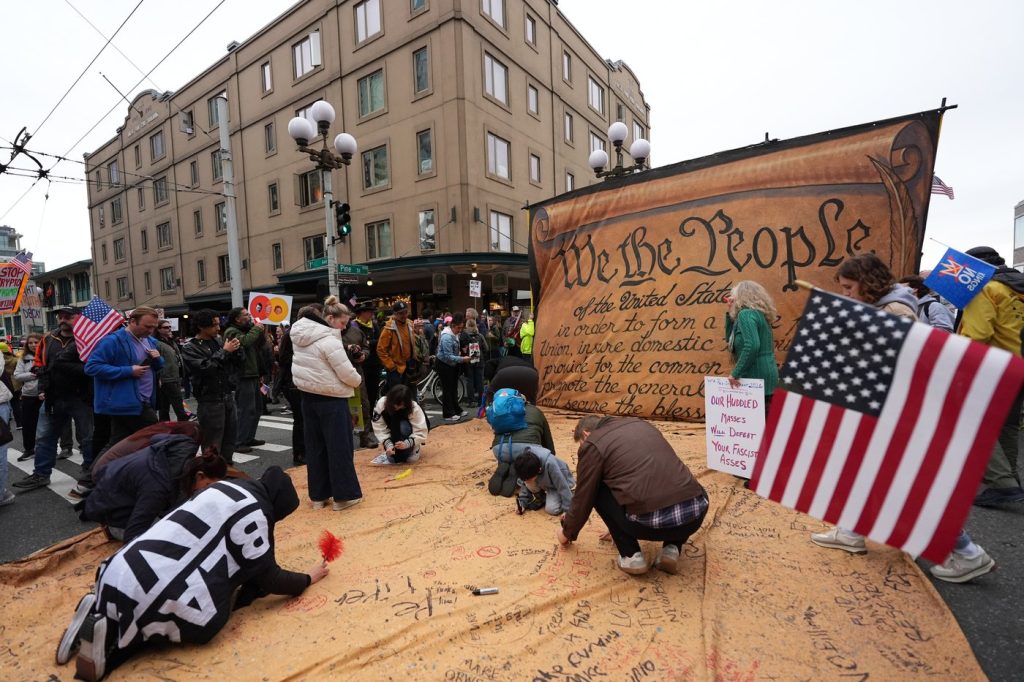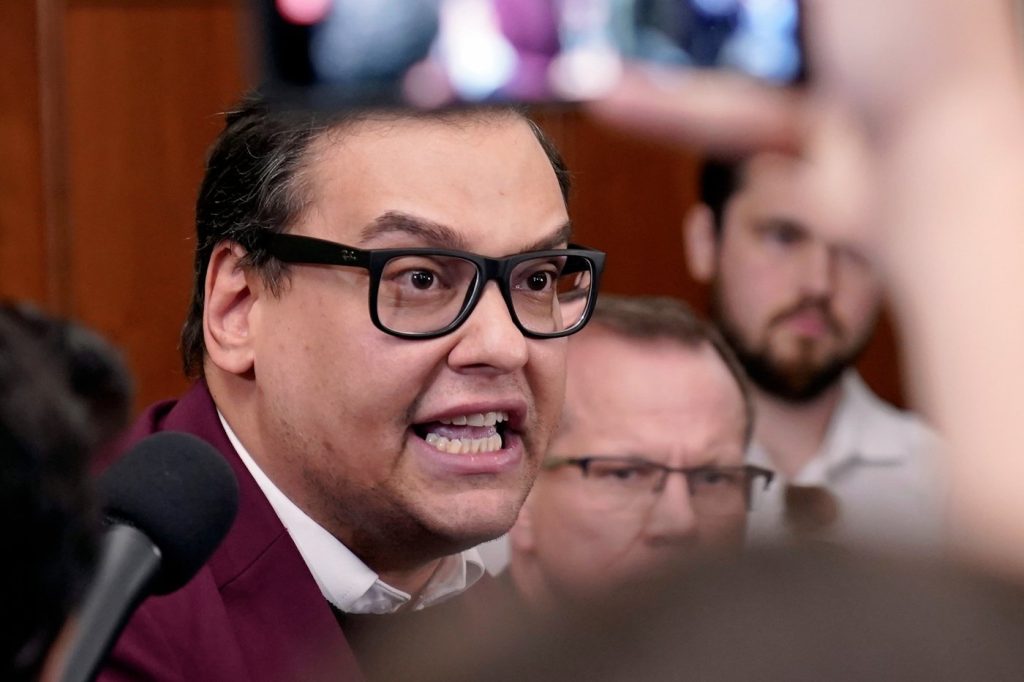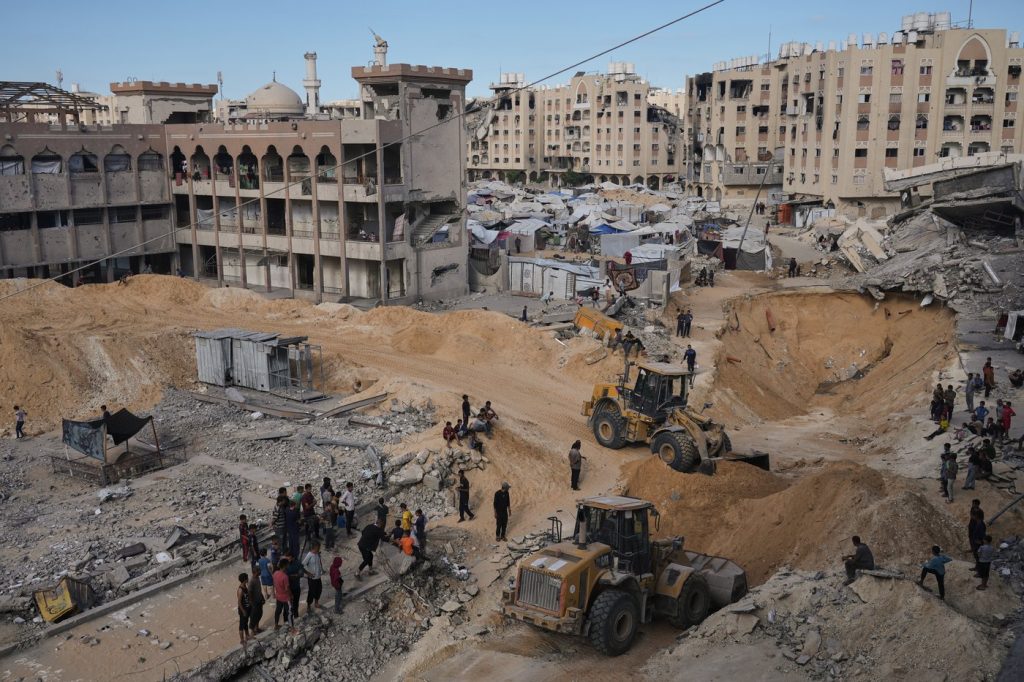On Saturday, large crowds of protesters gathered across the United States for "No Kings" demonstrations, expressing concerns over what they perceive as a swift shift toward authoritarianism under President Donald Trump. Participants carried signs with slogans such as “Nothing is more patriotic than protesting” and “Resist Fascism,” rallying in iconic locations like New York City's Times Square and parks in Boston, Atlanta, and Chicago. Demonstrators also marched through Washington, D.C., and downtown Los Angeles, as well as assembling outside state capitols across numerous Republican-led states and in smaller cities.
The Republican Party dismissed the demonstrations, labeling them as "Hate America" rallies. However, in many cities, the events resembled festive street parties, featuring marching bands, large banners with the U.S. Constitution’s “We The People” preamble for signing, and demonstrators dressed in inflatable costumes, notably frogs, which have become a symbol of resistance in Portland, Oregon.
This protest marked the third significant mobilization since Trump’s return to the White House, coinciding with a government shutdown that has halted various federal programs and services. Organizers have expressed that this situation exemplifies an erosion of democracy, as an assertive executive challenges both Congress and the courts.
One participant, Shawn Howard, an Iraq War Marine veteran, shared his motivations for attending, stating that he was compelled to protest due to what he views as Trump’s disregard for legal processes. Howard criticized practices like immigration detentions without due process and military deployments in U.S. cities, labeling them as “un-American” actions that threaten democratic principles.
While Trump spent the weekend at his Mar-a-Lago estate in Florida, he remarked in a Fox News interview that he does not see himself as a king, despite claims to the contrary. On social media, a campaign account for Trump humorously ridiculed the protests by sharing a digitally altered video of the president adorned as a monarch.
In San Francisco, hundreds of demonstrators gathered on Ocean Beach, forming large human letters that read "No King!" Hayley Wingard, dressed as the Statue of Liberty, expressed her growing concerns over Trump’s actions, stating her unease with military presence in cities like Los Angeles and her hometown of Portland.
Portland saw tens of thousands participating in the demonstrations, but the atmosphere became tense later when clashes occurred between several hundred protesters and counterprotesters outside a U.S. Immigration and Customs Enforcement building. Federal agents reportedly deployed tear gas to manage the situation, and city police threatened arrests for obstructing streets.
In Salt Lake City, roughly 3,500 gathered outside the Utah State Capitol for messages of hope and healing in the wake of a previous protest where a demonstrator lost their life. Additionally, more than 1,500 people convened in Birmingham, Alabama, reclaiming the city’s history as a significant site for civil rights activism, amidst a landscape where Trump received nearly 65% of the vote in the last election.
Senator Chris Murphy praised the large turnout, suggesting that such rallies empower those who have been hesitant to critique the current administration. He emphasized that collective demonstrations are vital as they unite opposition against Trump's controversial policies and governance style.
Over 2,600 rallies were organized nationwide, a notable increase compared to previous protests earlier in the year. Senate Minority Leader Chuck Schumer and Independent Senator Bernie Sanders joined to address crowd members, highlighting the threats posed by Trump’s presidency to democratic values while rallying support for grassroots movements.
On the political front, Republicans aimed to paint the protesters as radical elements, attributing the ongoing government shutdown—now in its 18th day—to their disruptive actions. GOP leaders accused Democratic leaders of capitulating to extremist groups among the more radical left, labeling the protests as indicative of a cultural decline in the nation.
Despite the serious undercurrents of the demonstrations, many protesters reacted with humor toward the harsh criticisms, reflecting on the dramatics often employed by Trump, like labeling cities he sends troops to as war zones. Some participants noted that their engagement in the protests was a lighthearted response to the seemingly exaggerated and theatrical tone of the administration.
As negotiations between Democrats and Republicans regarding government funding continue, the situation has shifted from initial party disorganization to a more united front among Democrats eager to assert their influence in the current political climate.












